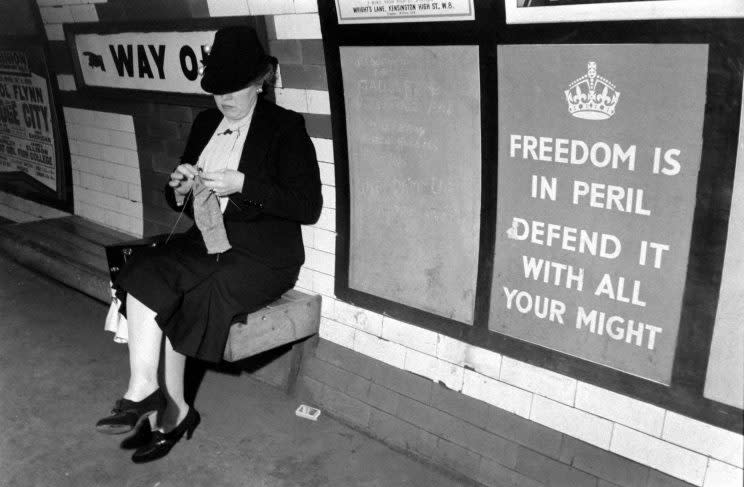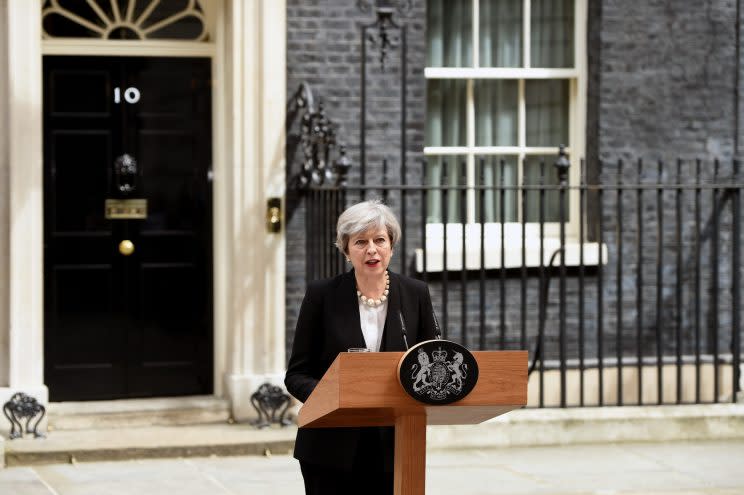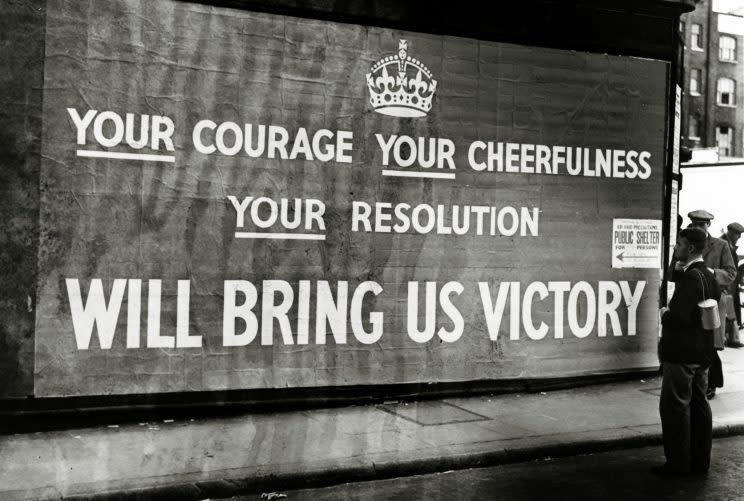‘Keep Calm and Carry On’: Manchester bombing rouses British stiff upper lip

In the aftermath of the deadliest terrorist attack on Northern England, Britons invoked a popular World War II-era expression of resilience and purpose: “Keep Calm and Carry On.”
The phrase comes from a morale-boosting poster created by the British government in 1939 for war against the Nazis. Though not officially used at the time, the inspirational poster took on a new life in the 21st century for people yearning for self-assurance and inner peace in the face of adversity.
ISIS claimed responsibility for the suicide bombing in the entrance hall to the Manchester Arena, which occurred around 10:30 p.m. local time Monday, as crowds of children and teenagers were leaving a concert by American pop singer Ariana Grande. The terrorist attack, which killed at least 22 and hospitalized 59, was the deadliest on British soil since the coordinated bombings on the London Underground on July 7, 2005.
For older Manchester residents, the bombing may bring back painful memories of the Irish Republican Army’s 1996 truck bombing, which injured more than 200, toward the end of the Northern Ireland conflict known as the Troubles.

While addressing her country following the attack, British Prime Minister Theresa May exhibited hints of the Victorian stoicism and “stiff upper lip” that’s traditionally been attributed to the British people during times of hardship. With calm and steady diction, she noted that this is not the first time terrorism has shaken Manchester.
“We struggle to understand the warped and twisted mind that sees a room packed with young children not as a scene to cherish but as an opportunity for carnage,” May said outside 10 Downing Street. “But we can continue to resolve to thwart such attacks in the future, to take on and defeat the ideology that often fuels this violence.”
Meanwhile, many of her countrymen garnered strength from their forebears who collectively kept their composure and sense of purpose amid nightly bombardments from Nazi Germany.
Citizens of the United Kingdom and well-wishers abroad started sharing messages of unity, using the quintessentially British expression from the mid-20th century on a fundamentally 21st century platform — Twitter.
We survived having bombs dropped on us during WW2 we can get through this, nothing defies British spirit #keepcalmandcarryon #Manchester????????????????
— Eloise???? (@eloisewalsh97) May 23, 2017
The #British spirit is indomitable. #ISIS is no match for the Nation that could #keepcalmandcarryon through Nazi bombardment.
— Matt Walje (@Matt_Walje) May 23, 2017
Truly disgusting what happened in the #ManchesterArena last night. But we'll show them what us Brits do best… we #keepcalmandcarryon
— Tom (@Tomdorama) May 23, 2017
Upside is the strength of people carrying on with they're day as normal…British Stiff up a lip in full affect ???????? #keepcalmandcarryon
— Mac (@Blazinros3) May 23, 2017
Today we must #keepcalmandcarryon
— Victor Yong (@BigVic_AFL) May 23, 2017
Words can't describe how sad we are feeling today. We are strong and resilient #keepcalmandcarryon #PrayForManchester
— Nebular Cloud IT (@nebularclouduk) May 23, 2017
Just so shocked that something like this happened.. my heart goes out to everyone ❤ #Britan #ManchesterBombing #keepcalmandcarryon pic.twitter.com/BYGjrvpBTO
— ★☆★LAURA★☆★ (@Laura_Slater123) May 23, 2017
Thoughts and prayers from #Madagascar are with the victims of the explosions in Manchester and their loved ones. #keepcalmandcarryon
— Tahiry (@Ratsimandao) May 23, 2017
"God is our refuge and strength, an ever present help in trouble."
-Psalm 46:1 ???????? #KeepCalmAndCarryOn— AJAXTaylor (@AJAXTaylor) May 23, 2017
Fucking disgusted by events in #Manchester last night, WE will not be beaten as a country against terror #KeepCalmAndCarryOn#RIP
— Matthew Morgan (@scouserboy1978) May 23, 2017
If there's one thing us Brits are good at – it's #keepcalmandcarryon – we will rebuild – we will over come – #StandTogether
— Colin McCrory (@colinmccrory101) May 23, 2017
My condolences for the families who lost loved ones. My heart aches for those suffering right now. #KeepCalmAndCarryOn #Manchester
— Dee ???????? (@DeannaBTN) May 23, 2017
What do these morons get out of killing kids? Innocent people? You're not going to wind up on top. #keepcalmandcarryon #ILoveMCR
— Invisible Man ???? (@MrLukasBye) May 23, 2017
No matter what they throw at us, we won't give in, never have never will #keepcalmandcarryon #lovewins #WeStandTogether #manchester #RIP pic.twitter.com/QxCfHRvMri
— Lauren (@laurenannerose5) May 23, 2017
The people of #Manchester brought supplies and opened up their homes to survivors. #Love #KeepCalmAndCarryOn #ManchesterBombing
— Jena Tesse Fox (@JenaTesse) May 23, 2017
— Bethany Grace ???? (@muse_egrace) May 23, 2017
In late 1939, the British government tasked the Ministry of Information, which was responsible for propaganda and publicity, to create motivational posters to be displayed across the United Kingdom for the impending dark days of World War II.
This led to the creation and display of two posters, reading “Your Courage, Your Cheerfulness, Your Resolution Will Bring Us Victory” and “Freedom Is in Peril, Defend It With All Your Might.” Over 2 ½ million copies of a third poster, “Keep Calm and Carry On,” had been created for use if the Germans ever sent ground troops into Britain — which never happened.
More than 50 years after World War II ended, Stuart Manley, a bookseller for Barter Books in northeastern England, found a copy of the largely forgotten “Keep Calm and Carry On” poster amid a pile of old books purchased at an auction. His wife, Mary Manley, liked the poster so much that she had it framed and hung it in their shop near the cash register.
The poster attracted so much attention from customers that they started to sell copies. Other companies started to produce their own copies of the wartime poster, and it became a world-famous image, inspiring countless imitations and parodies.

Read more from Yahoo News:
‘The most horrible feeling’: Mother of missing Manchester concertgoer describes chaos of attack
Pentagon report shows Flynn misled investigators about Russia trip
‘Operation Git-Meow’: The mission to save Gitmo’s feral cats
As Iraqi forces close in on ISIS and Mosul, civilians are still caught in the crossfire
Photos: Deadly blast at Ariana Grande concert in Manchester, England



